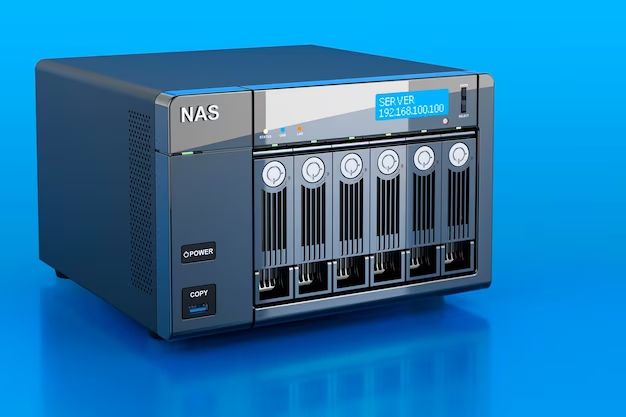A home NAS (Network Attached Storage) device allows you to create your own personal cloud storage solution. Here are some quick answers to common questions about NAS devices:
What does a NAS do?
A NAS is essentially a small server that connects to your home network, allowing you to store and access files remotely. It provides centralized storage and backup for all connected devices.
Why would I want a NAS?
There are several key benefits to having a home NAS:
- Centralized storage – Store all your files in one place for easy access
- Backup – Automatically back up files from multiple devices
- Accessibility – Access files remotely from anywhere
- Shared storage – Allow multiple users/devices to access the same files
- Media server – Stream media files to connected devices
- Redundancy – Set up RAID to protect against drive failure
What features should I look for in a NAS?
Some key features to consider when selecting a NAS include:
- Storage capacity – More bays allow for more storage and upgradability
- Processor – Faster processor enables better performance
- RAM – More RAM improves multitasking ability
- Network connections – Faster network standards like 10GbE enable faster transfers
- RAID support – Allows drives to be configured for redundancy
- Remote access – Allows accessing the NAS outside the home network
- Media server software – For streaming media files to TVs and devices
- Backup software – For easy scheduled backups from PCs and phones
What are the main NAS operating systems?
The most common NAS operating systems are:
- Synology DiskStation Manager (DSM) – Very user-friendly with lots of apps and features
- QNAP QTS – Also feature-rich and regularly updated
- Asustor ADM – Polished OS with emphasis on multimedia
- NETGEAR ReadyNAS – Focus on ease of use and affordability
- FreeNAS – Free open source OS with advanced capabilities
These optimized NAS operating systems offer user-friendly web interfaces to manage storage, apps, backups and more.
What types of drives should I use?
NAS drives are optimized for durability, reliability and 24/7 operation. Recommended drive types include:
- NAS/Enterprise HDDs – Made for constant operation with high reliability
- Surveillance HDDs – Meant for writing large amounts of data continuously
- SSDs – No moving parts and better performance but more expensive per GB
For the best performance and redundancy, configure multiple drives in RAID. Higher-end NAS units may also leverage SSD caching.
How much storage and RAM capacity should I get?
Consider your current and future storage needs. 2 to 8 bay NAS units offering 4TB to 32TB storage are common for home use. Get more bays and drives than you need to allow expanding storage later.
For RAM, 1GB per 1TB of storage is a common ratio. More RAM improves multitasking and performance. Many NAS units support adding RAM down the road.
Should my NAS be connected via WiFi or Ethernet?
For best performance, always connect your NAS via Ethernet, especially for initial setup. Ethernet offers faster and more reliable throughput compared to WiFi. Use wired connections for any device that will stream media files from the NAS.
However, you can enable WiFi as a secondary option on most NAS units to access files when away from home. Just make sure your WiFi network is fast enough to avoid bottlenecks.
Can I access my NAS files remotely?
Most NAS operating systems offer mobile apps or web interfaces to enable securely accessing your files anywhere with an internet connection. Features like QuickConnect (Synology) or myQNAPcloud (QNAP) simplify setting up remote access.
You can also connect to your NAS over the internet using a VPN connection for complete privacy.
Can I use my old computer as a NAS?
You can convert an old desktop PC or laptop into a basic NAS device using free software like FreeNAS or OpenMediaVault. This DIY approach gives you more customization options.
However, commercial NAS devices are engineered for 24/7 operation, include drive bays and RAID support, and offer user-friendly software. So a dedicated NAS is better for most home users.
Can I back up my PC and phone to a NAS?
Backup support is a key feature of all major NAS platforms. They allow automatic backup of Windows PCs, Macs, smartphones, tablets, and more. Solutions like Apple Time Machine are also supported.
Backup schedules, versioning, incremental backups to conserve space, and encryption are common features. Offsite/cloud backups can augment onsite NAS backups for maximum data protection.
Can I use a NAS as a media server?
Most NAS platforms support DLNA media server software to stream videos, music and photos to smart TVs, game consoles, mobiles and more. Media catalogs, cover art, playlists and subtitles are common management features.
Plex, Emby and Kodi are popular third-party apps that can turn a NAS into a full-featured home media server. Some NAS devices even include HDMI ports for direct media playback.
Can I run other apps on a NAS?
Beyond just file storage, leading NAS operating systems allow installing a wide array of apps and tools via app stores or package managers. These include torrent clients, web servers, CRM software, databases, and more.
Virtualization support also allows you to run virtual machines and Docker containers on NAS hardware for added flexibility.
Is a NAS worth the cost for home use?
While a DIY NAS with old hardware is cheaper, commercial NAS units start around $200 and offer better performance,expandability and software features. For simplicity, reliability, no tinkering and full-featured apps, a dedicated NAS is worth the investment for most home users.
Conclusion
In summary, a home NAS provides centralized secure storage and backup, easy remote access to files, streaming of multimedia, and a platform to run apps and tools – making it a versatile addition to any connected home. From protecting data to accessing it anywhere, a quality NAS gives home users serious storage flexibility.

